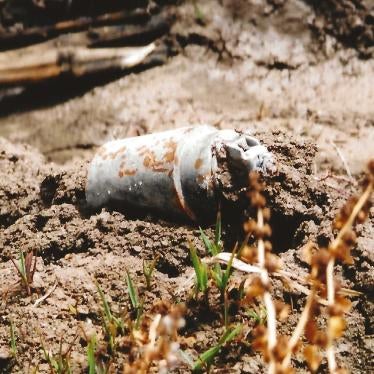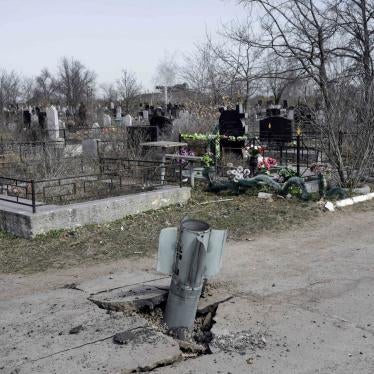August 21, 2015
To: Alexander Zakharchenko
Head of self-proclaimed Donetsk People’s Republic
Administration of Donetsk People’s Republic
Dear Mr. Zakharchenko,
I am writing to bring to your attention some important concerns regarding the situation for civilians in Ukraine-controlled towns in the vicinity of the frontline, specifically in Avdiivka, 15 km northwest of Donetsk, which has been subjected to frequent shelling, apparently by the armed forces of the self-proclaimed Donetsk People’s Republic (DPR). We call on you to ensure that as a party to the conflict, DPR leadership and its forces conduct themselves in full compliance with international humanitarian law, including by doing their utmost to minimize civilian harm in the course of the fighting.
During a research trip to Avdiivka on July 19-20, Human Rights Watch documented several recent civilian casualties apparently resulting from DPR shelling: two people were killed as a shell exploded in their apartment on July 18; another two people were wounded in a shelling attack on the Avdiivka Chemical Coke Plant late on the night of July 11-12.
***
In the first case, early on the morning of July 18 a shell hit an apartment on the eighth floor of a nine-story apartment building at Molodezhnaya 20 killing 73-year-old Anna Kostina, and her 20-year-old grandson, Sergei Malashkov. In its report dated July 20, the OSCE Special Monitoring mission indicated that it had received information that the shelling had come “from the direction of ‘DPR’-controlled Spartak (10 km northwest of Donetsk),” which is an assessment we support.
The apartment building at Molodezhnaya has suffered particularly severe damage from shelling over this past year, and some of the apartments have been turned into craters as a result of direct hits. The building has 136 apartments in it, and 12 families still live there despite regular shelling attacks. The presence of a Ukrainian military target in immediate vicinity of Molodezhnaya 20 most likely accounts for frequent shelling of the area by DPR forces. Several other apartment buildings close to Molodezhnaya 20 have also been damaged by shelling. In that respect, we have urged the Ukrainian leadership not to endanger civilians in the territories under their control by placing military targets in densely populated civilian areas, and if required by military necessity to evacuate civilians in proximity to military targets. On the other hand, based on our on-the-ground observations, including close examination of the impact site, craters, and the surrounding area, as well as our analysis of videos posted online, the area was attacked by indirect artillery fire from either large-caliber howitzers or mortars. Both are the kinds of explosive weapons that all parties to the conflict should refrain from using in densely populated areas because of their wide-area effects.
Several residents of Molodezhnaya 20 who were in the building during the shelling attack on July 18 told us that the shelling began at 4:25 in the morning, with numerous shells landing in immediate proximity to the building one after the other. The attack continued for over an hour. When they finally felt safe enough to step outside to assess the damage, they saw that Anna Kostina's apartment was gone. Two women rushed up to see whether their neighbors were still alive and needed help. "We saw Seryozha's [Sergei Malashkov’s] body in the hall, next to the door of the neighboring apartment…" one of the women told us: "We left him there and entered what was left of Granny Anya's flat. At first, we could not see her amid the debris…. I even thought, what if she's alive and someone else got her ahead of us and actually got her out…and then, I saw a fragment of her face in a pile of debris."
Having brought this incident to your attention, we call on you to urge the forces under your control to avoid using wide-area effects weapons in densely populated areas, as the use of such weapons is likely to result in civilian harm disproportionate to the military gain. According to media reports, in the intervening four weeks since our research trip to Avdiivka, another three local residents were killed as a result of shelling attacks.
***
Secondly, we would like to raise with you the repeated shelling of the Avdiivka Chemical Coke Plant, apparently carried out by DPR forces. The Avdiivka Chemical Coke Plant is a civilian commercial property, privately owned by Metinvest Holding. We visited the plant on July 20 and did not register any presence of military targets in the vicinity. Coal coke, which the plant produces, is used by civilians for civilian purposes and has no military use. The plant therefore should be presumed to be a civilian object. Moreover, the Avdiivka Chemical Coke Plant is instrumental to the metal manufacture in Ukraine, and there are good grounds to believe that Ukrainian officials are correct in their assumptions that DPR forces’ attempt to destroy the plant, is for the objective of inflicting damage on the Ukrainian metal industry. Under international humanitarian law, this objective cannot justify repeated shelling of a civilian object.
Based on the information from open sources, the plant was shelled 13 times from January through August this year. A representative of the plant’s security service we met in Avdiivka told us that to the best of his knowledge, two staff members of the plant have been killed by shelling this year and another ten have been wounded. In August, in response to an inquiry by Human Rights Watch, the head of Metinvest press service said that 5 staff members of the plant were killed and another 38 were wounded between January 1 and August 19, 2015 (and that a total of 9 staff had been killed and 50 wounded since July 2014). Ukrainian military officials repeatedly flagged, including to the OSCE Special Monitoring Mission, that the shelling of the Avdiivka Chemical Coke plant is carried out from DPR positions at the Donetsk airport, Spartak (10 km northwest of Donetsk), and Yasynuvata (12 km north of Donetsk).
In the incident we documented during our research trip to Avdiivka, the plant was subjected to massive artillery shelling just after 11 p.m. on July 11, with several dozens of shells exploding around the railroad unit of the plant, damaging two high-voltage leads and resulting in temporary suspension of production. Two security guards on night duty by the railroad unit, Vitaly Nikulin and Vladimir Pogorelov, were caught in the shelling, and hit by shell fragments when the first shell exploded in the vicinity of their booth next to the railroad tracks. It took emergency workers approximately half-an-hour to reach them, as the shelling was still on-going, during which time they were bleeding out on the ground. Pogorelov, who suffered a “traumatic arm amputation,” nearly bled to death before help could arrive. Nikulin suffered shell fragmentation wounds to his chest, right lower leg, left forearm, and multiple skin abrasions.
Nikulin, a 43-year-old resident of Avdiivka, spoke to Human Rights Watch at the Kurakhovo hospital, as he was still bed-ridden nine days after the attack: “The shelling began around 11 p.m. Vladimir and I could hear explosions at a distance, seemed like mortars, but this is something we are used to... And then something exploded practically next to us and both Vladimir and I were hit. We do have shelters at the plant, everything is well prepared, shelling being so frequent, but we simply did not have the time to get there. We ran out of the booth – and that was it. Vladimir lost an arm, there was so much blood. I was also bleeding and could not figure out how serious it was with me. It all happened so fast, I didn’t even feel the pain first… We were flat on the ground. I went practically deaf from that first explosion, there was ringing in my ears… Shells hit the ground some 20-50 meters away. Like a few dozen of them. We stayed like that for the next 30 minutes or so, and then fire fighters from the emergency services came for us, dragged us to a safer place with the shelling continuing for another 10 minutes, and then drove us to the hospital here [in Avdiivka]. They could not believe Vladimir was still alive considering how much blood he lost.”
In response to a question by Human Rights Watch, Nikulin stated that there’s been no Ukrainian military presence in the territory of the plant or next to it, “however, the plant has been shelled on numerous occasions during this past year; on occasion it can be quiet for one whole month and then it’s back to two-three attacks in a week.”
The Avdiivka Chemical Coke Plant employs around 4,000 civilians, whose life and physical health are endangered by frequent shelling. Also, coke production involves distillation of some toxic chemical elements (for example, benzol, a toxic carcinogenic substance, and phenol, a toxic substance that may cause severe skin burns), and shell explosions in proximity to these substances could result in acute or chronic poisoning and tissue damage for nearby civilians and have grave negative consequences for the environment, including water contamination. In light of your obligation to minimize civilian harm, we urge you to refrain from attacks on the plant and generally to respect the obligation to distinguish at all times between civilian objects and military objectives, and adhere to the prohibition on directing attacks against non-military targets.
Yours sincerely,
Hugh Williamson
Director
Europe and Central Asia Division
Human Rights Watch







